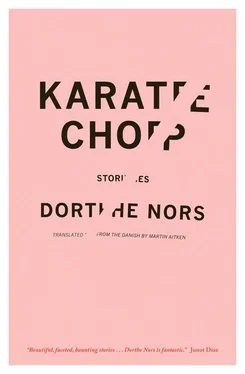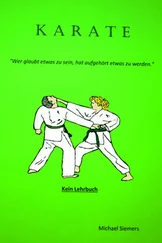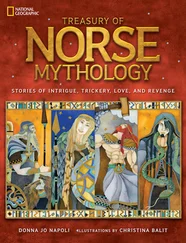Dorthe Nors - Karate Chop - Stories
Здесь есть возможность читать онлайн «Dorthe Nors - Karate Chop - Stories» весь текст электронной книги совершенно бесплатно (целиком полную версию без сокращений). В некоторых случаях можно слушать аудио, скачать через торрент в формате fb2 и присутствует краткое содержание. Год выпуска: 2014, ISBN: 2014, Издательство: Graywolf Press, Жанр: Современная проза, на английском языке. Описание произведения, (предисловие) а так же отзывы посетителей доступны на портале библиотеки ЛибКат.
- Название:Karate Chop: Stories
- Автор:
- Издательство:Graywolf Press
- Жанр:
- Год:2014
- ISBN:9781555970857
- Рейтинг книги:5 / 5. Голосов: 1
-
Избранное:Добавить в избранное
- Отзывы:
-
Ваша оценка:
- 100
- 1
- 2
- 3
- 4
- 5
Karate Chop: Stories: краткое содержание, описание и аннотация
Предлагаем к чтению аннотацию, описание, краткое содержание или предисловие (зависит от того, что написал сам автор книги «Karate Chop: Stories»). Если вы не нашли необходимую информацию о книге — напишите в комментариях, мы постараемся отыскать её.
A Public Space
Karate Chop
Karate Chop: Stories — читать онлайн бесплатно полную книгу (весь текст) целиком
Ниже представлен текст книги, разбитый по страницам. Система сохранения места последней прочитанной страницы, позволяет с удобством читать онлайн бесплатно книгу «Karate Chop: Stories», без необходимости каждый раз заново искать на чём Вы остановились. Поставьте закладку, и сможете в любой момент перейти на страницу, на которой закончили чтение.
Интервал:
Закладка:
A person is born with the ability to reach out for things in the world. Thus, an infant will clutch at any finger that is extended toward it, for the child wants to live, and in order to live it must get its hands dirty. It is the retention of this basic reaching out into the world that characterizes genetic predisposition to naïveté in the adult human. It’s bred into us. The monkey’s young reach immediately for the mother’s fur and use its tufts as handles during transport on their perilous way through the jungle, and on another level we must not forget that the reflex moreover is cosmic, since humans reach out in more or less the same way to God and all else unknown. But let’s return to Nat Newsom.
Nat Newsom stood outside McDonald’s every day trying to make it look like he was helping people by opening and closing the door. The reality of the matter was that his handicap prevented him from truly making a difference, but at least he showed himself to be willing. Doing so allowed him to save up so that at the end of the day he could go through the door himself and purchase a Happy Meal. Having observed Nat Newsom for some time I decided one morning to ask if he would be interested in taking part in my study of existential behavior at Columbia’s philosophy department, where I am known as Professor Jack Soya. Nat agreed, and we arranged to meet over a beer in a bar that same evening. Nat showed up on time.
He told me he was born to an alcoholic mother who had also experimented with amphetamines during the pregnancy, a cocktail that resulted in Nat entering the world as smooth as soap, unable to grasp hold of anything at all. Where his fingers were supposed to be he had only stumps, so Nat drank his beer through a straw. I studied his hands as he did so: both were equipped with a minuscule thumb that more than anything else resembled a baby kangaroo when, tiny and covered in slime, it slips out of the female kangaroo’s birth canal to slowly (and, in accordance with its genetic predisposition, naively) crawl upward through its mother’s fur and into her pouch, there to latch onto the nipple with its entire body, which mostly consists of a mouth. A journey, incidentally, that may be compared to the (likewise innately naive) wandering made by the newly hatched young of the sea turtle amid a rain of dive-bombing seagulls from their warm hollow in the sand to the infinitely large and embracing ocean.
Nat Newsom grew up without the ability to think strategically, yet with an abundance of enterprise and a close relationship to his mother’s sister, who quickly took her place. My aunt could not be brought down , Nat told me, and I dwelled on his comment. People like Nat Newsom appear to be equipped with their own center of gravity insofar as they seem able to maintain an open outlook on the world almost regardless of whatever it may allot them. This is not to say that this naïveté cannot take up temporary residence in the prison of the mind if, during an attempt to reach out, it happens to burn its fingers. But inside, such people are toddlers. They look at their burns and bruises, their emptied bank accounts and broken dreams, as though it were an eternal source of astonishment to them that malice actually exists.
I would like to stress this propensity to wonder, this willingness to believe, by relating one key scene in Nat Newsom’s life. One day in front of the New York Public Library, Nat and a friend are accosted by a man wearing a cheap suit. The man in question is white, a matter of no real consequence, but on the lapel of his jacket is affixed an ID badge with a black man’s photograph on it. The badge says the man’s name is Charlie, and yet this white man introduces himself as Kevin Miller. Charlie or Kevin addresses Nat Newsom’s buddy, not Nat himself, who is visibly handicapped. The man stands right up close to Nat’s buddy and says he can see he pumps iron. And then he produces a questionnaire and a ballpoint pen from a pocket of his suit.
From the sideline Nat now witnesses this man with the two names explain to his friend that he is from a university up in Harlem. He tells him he is collecting money for a rehab program for drug addicts. He wants to know if Nat’s buddy would like to make a donation, and he would also like to know what gym he goes to. Nat Newsom’s buddy is not a homosexual, and yet Nat can tell he is flattered when the man says that he is, and that he likes men with the build of Nat’s buddy.
Two things are happening here. One is that Nat’s buddy is disarmed by charm. The hustler, which of course is what the man is, caresses the buddy’s ego, which according to Nat Newsom was an easy target for flattery. The fact that Nat’s friend gets taken for a ride is due to this flaw in his personality and not with him being genetically predisposed to naïveté. And we should believe Nat, for whom lying was so difficult, when he claims that his buddy was not in the slightest bit naive. But Nat, who was predisposed in that way, catches on to the nature of the transaction. What happens with Nat is that one part of him thinks: What a nice guy, and it’s such a good thing there are people willing to help drug addicts , while another part thinks: This guy is a swindler, cheating unsuspecting people out of their money. Nat Newsom is of two minds. He can see that the questionnaire doesn’t even mention drug addicts. He can see that the black man is white. Nothing adds up, but despite this double insight Nat neglects to warn his buddy. Moreover, he does nothing to stop him handing over ten dollars for the rehab program in Harlem. And not only that: Nat Newsom turns his backside to the swindler and asks him to take ten dollars out of his back pocket. I can’t do it myself , says Nat, waving his little thumbs and stumps in front of the guy, who gladly helps him out with his problem.
As we sat there in the bar I asked Nat Newsom why he hadn’t intervened to stop the hustle. I asked him, too, why he let himself be shaken down like that. I recall Nat’s tiny thumbs on the tabletop as he sucked his beer through his straw. Then he leaned back and explained to me that if the world was like a person sometimes thought it was, then he wouldn’t have the courage to even open his eyes in the mornings. He also said that if it was a choice between losing ten dollars and losing confidence in the possibility of people being called Kevin and Charlie and being black and white at the same time, then he preferred to lose ten dollars.
I never made use of Nat Newsom in my studies of genetically predisposed naïveté. He was too odd for that. But even though as research material he was unsuitable for my dissertation, Jack Soya’s Laws of Strategy , I will never forget him, not least because a short time later someone kicked him so hard in the head during an incident out at JFK that what little sense he had inside him could not be saved. I briefly considered adding him to the notes, but decided against it. A good scientist is known by his ability to select.
HAIR SALON
I LIVE IN A TWO-ROOM APARTMENT IN A BUILDING AWAY FROM THE center. It’s not long since I moved out here and I don’t know many people. I asked the hairstylist on the opposite corner how much he charged compared to the ones in the city:
“Practically nothing,” he said, and asked me to lean my head back farther.
For smoking cigarettes and drinking coffee with the hairstylist I get my hair done for half price. Once in a while, the fat lady who lives in our building walks by on the street outside. She has permission to keep a dog in her apartment, because her dog can’t bark. I asked the hairstylist what kind of a dog can’t bark. He said it was because the fat lady gives the dog her medication. Apparently, she said it’s to be on the safe side. Which is fine by me. I don’t care one way or the other, and when the hairstylist asks me why I’m down in the dumps I talk about something else, or I say with a wry smile I don’t like to see in the mirror:
Читать дальшеИнтервал:
Закладка:
Похожие книги на «Karate Chop: Stories»
Представляем Вашему вниманию похожие книги на «Karate Chop: Stories» списком для выбора. Мы отобрали схожую по названию и смыслу литературу в надежде предоставить читателям больше вариантов отыскать новые, интересные, ещё непрочитанные произведения.
Обсуждение, отзывы о книге «Karate Chop: Stories» и просто собственные мнения читателей. Оставьте ваши комментарии, напишите, что Вы думаете о произведении, его смысле или главных героях. Укажите что конкретно понравилось, а что нет, и почему Вы так считаете.












